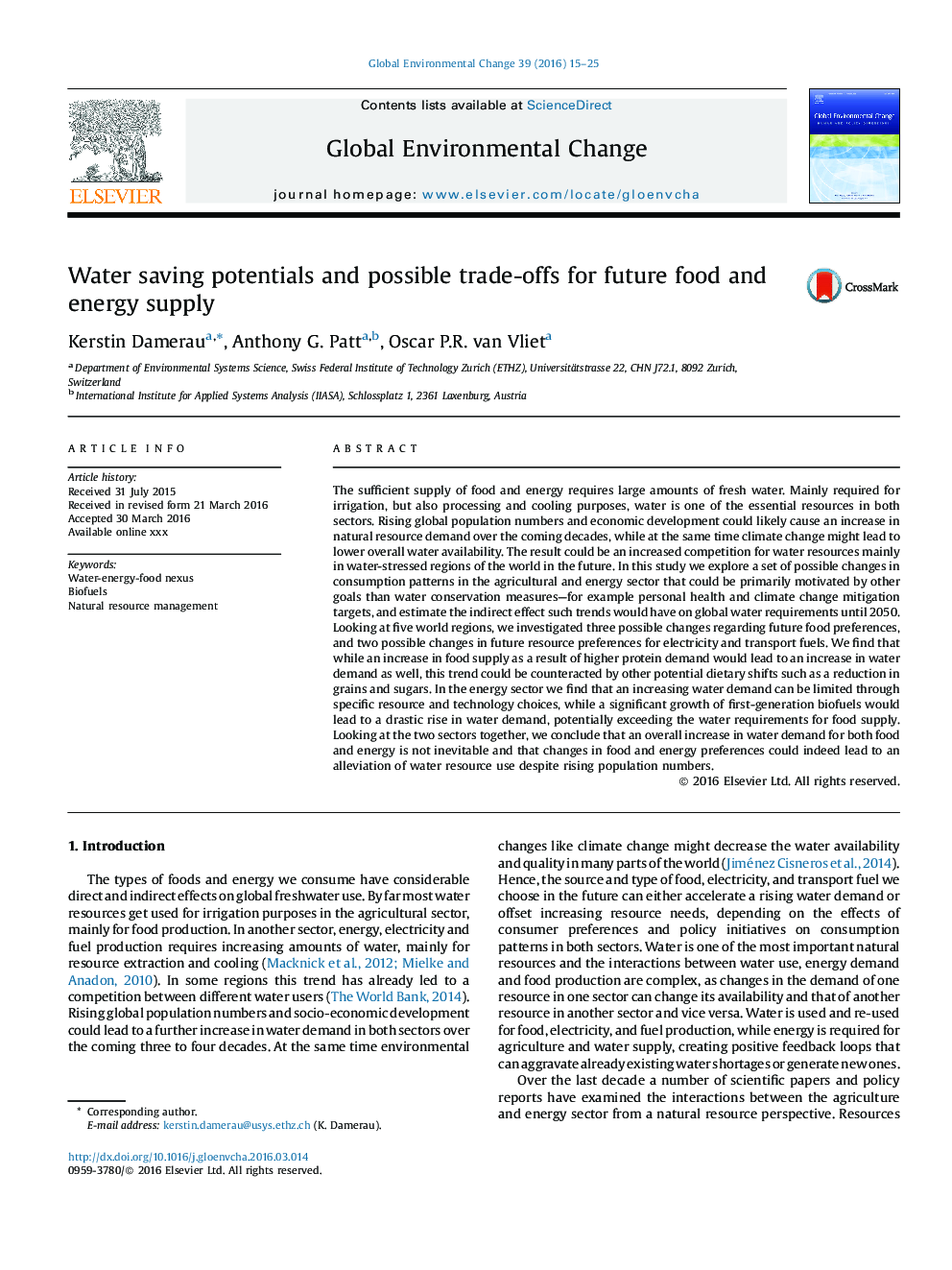| کد مقاله | کد نشریه | سال انتشار | مقاله انگلیسی | نسخه تمام متن |
|---|---|---|---|---|
| 7469280 | 1485119 | 2016 | 11 صفحه PDF | دانلود رایگان |
عنوان انگلیسی مقاله ISI
Water saving potentials and possible trade-offs for future food and energy supply
ترجمه فارسی عنوان
پتانسیل صرفه جویی در مصرف آب و امکان بروز اختلافات در مورد تغذیه و عرضه انرژی در آینده
دانلود مقاله + سفارش ترجمه
دانلود مقاله ISI انگلیسی
رایگان برای ایرانیان
کلمات کلیدی
آب نوشیدنی انرژی و مواد غذایی، سوخت های زیستی، مدیریت منابع طبیعی،
ترجمه چکیده
تامین کافی غذا و انرژی نیاز به مقدار زیادی آب تازه دارد. آب مورد نیاز برای آبیاری، بلکه همچنین برای پردازش و خنک کننده، یکی از منابع ضروری در هر دو بخش است. افزایش تعداد جمعیت جهانی و توسعه اقتصادی به احتمال زیاد می تواند موجب افزایش تقاضای منابع طبیعی در دهه های آتی شود، در عین حال تغییرات آب و هوایی می تواند منجر به پایین بودن دسترسی کلی به آب شود. نتیجه می تواند رقابت افزایش یافته برای منابع آب به طور عمده در مناطق آرسنیک جهان در آینده باشد. در این مطالعه، مجموعه ای از تغییرات احتمالی الگوهای مصرف در بخش کشاورزی و انرژی را کشف می کنیم که عمدتا توسط اهداف دیگری از اقدامات حفاظت از آب انگیزه می شود، مثلا اهداف کاهش سلامت شخصی و شخصی، و تأثیر غیر مستقیم بر روی این روند تا سال 2050 بر نیازهای جهانی آب تأثیر می گذارند. با نگاهی به پنج منطقه جهان، ما سه تغییر احتمالی در مورد تنظیمات غذایی آینده و دو تغییر احتمالی در ترجیحات منابع آینده برای سوخت های الکتریکی و حمل و نقل مورد بررسی قرار دادیم. ما دریافتیم که در حالی که افزایش عرضه مواد غذایی به علت افزایش تقاضای پروتئین باعث افزایش تقاضای آب می شود، این روند می تواند با سایر تغییرات جسمی بالقوه مانند کاهش غلات و قندها نیز مقابله شود. در بخش انرژی ما دریافتیم که افزایش تقاضای آب می تواند از طریق انتخاب منابع و تکنولوژی خاص محدود شود، در حالی که رشد قابل توجهی از سوخت های زیستی نسل اول منجر به افزایش شدید تقاضای آب می شود که به طور بالقوه بیش از نیاز آب برای تامین مواد غذایی است. با نگاهی به دو بخش با هم، ما نتیجه می گیریم که افزایش کلی تقاضای آب برای مواد غذایی و انرژی اجتناب ناپذیر است و تغییرات در تنظیمات غذا و انرژی در واقع می تواند به کاهش استفاده از منابع آب با وجود افزایش تعداد جمعیت منجر شود.
موضوعات مرتبط
علوم زیستی و بیوفناوری
علوم محیط زیست
علوم زیست محیطی (عمومی)
چکیده انگلیسی
The sufficient supply of food and energy requires large amounts of fresh water. Mainly required for irrigation, but also processing and cooling purposes, water is one of the essential resources in both sectors. Rising global population numbers and economic development could likely cause an increase in natural resource demand over the coming decades, while at the same time climate change might lead to lower overall water availability. The result could be an increased competition for water resources mainly in water-stressed regions of the world in the future. In this study we explore a set of possible changes in consumption patterns in the agricultural and energy sector that could be primarily motivated by other goals than water conservation measures-for example personal health and climate change mitigation targets, and estimate the indirect effect such trends would have on global water requirements until 2050. Looking at five world regions, we investigated three possible changes regarding future food preferences, and two possible changes in future resource preferences for electricity and transport fuels. We find that while an increase in food supply as a result of higher protein demand would lead to an increase in water demand as well, this trend could be counteracted by other potential dietary shifts such as a reduction in grains and sugars. In the energy sector we find that an increasing water demand can be limited through specific resource and technology choices, while a significant growth of first-generation biofuels would lead to a drastic rise in water demand, potentially exceeding the water requirements for food supply. Looking at the two sectors together, we conclude that an overall increase in water demand for both food and energy is not inevitable and that changes in food and energy preferences could indeed lead to an alleviation of water resource use despite rising population numbers.
ناشر
Database: Elsevier - ScienceDirect (ساینس دایرکت)
Journal: Global Environmental Change - Volume 39, July 2016, Pages 15-25
Journal: Global Environmental Change - Volume 39, July 2016, Pages 15-25
نویسندگان
Kerstin Damerau, Anthony G. Patt, Oscar P.R. van Vliet,
